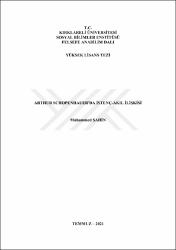| dc.contributor.advisor | Kılıç, Elife | |
| dc.contributor.author | Şahin, Muhammed | |
| dc.date.accessioned | 2021-12-11T19:41:42Z | |
| dc.date.available | 2021-12-11T19:41:42Z | |
| dc.date.issued | 2021 | |
| dc.identifier.uri | https://tez.yok.gov.tr/UlusalTezMerkezi/TezGoster?key=tqUiYt63sTQLTpozMJ92Qmhepe0TVAJZu9NaFcZwRP00QIwedRhUCh6wcJ4eG0CF | |
| dc.identifier.uri | https://hdl.handle.net/20.500.11857/1536 | |
| dc.description | YÖK Tez: 690162 | |
| dc.description.abstract | Karamsar kişiliğiyle bilinen Alman filozof Arthur Schopenhauer'a göre, dünyanın ve varoluşun belirli bir anlamı yoktur. Dünya, anlaşılmayan, mantıksız ilkeler üzerine kuruludur. Bu ilkelerin ontolojik olarak dayandığı temel kavram ise istençtir. Schopenhauer felsefesinde istenç, akılsız, bilinçsiz ve aklın denetiminden uzak bir öze sahiptir. İstenç dünyanın özüdür, görünen tüm şeylerin kaynağıdır ve insan bedeni de istencin eseridir. Akıl ise istencin kendi isteklerini yerine getirmek için yaratmış olduğu zihinsel bir yeti, bir özelliktir. Bu anlamda Schopenhauer'da birincil ve tek gerçeklik istençtir, akıl ise ikincildir. Buradan hareketle, bu çalışmada amaçlanan Schopenhauer felsefesinde istenç-akıl ilişkisini inceleyerek onun felsefede akılcı geleneğe karşı duruşunu göstermektir. | |
| dc.description.abstract | According to the German philosopher Arthur Schopenhauer, known for his pessimistic personality, the world and existence have no specific meaning. The world is built on incomprehensible, illogical principles. The basic concept on which these principles are ontologically based is will. In Schopenhauer's philosophy, the will has an essence that is mindless, unconscious and far from the control of the mind. The will is the essence of the world, the source of all visible things, and the human body is the work of the will. Mind, on the other hand, is a mental faculty, a feature created by the will to fulfill its own wishes. In this sense, the primary and only reality in Schopenhauer is will, while reason is secondary. From this point of view, the aim of this study is to examine the will-reason relationship in Schopenhauer's philosophy and to show his stance against the rational tradition in philosophy. | |
| dc.language.iso | tur | |
| dc.publisher | Kırklareli Üniversitesi | |
| dc.rights | info:eu-repo/semantics/openAccess | |
| dc.subject | Felsefe | |
| dc.subject | Philosophy | |
| dc.title | Arthur Schopenhauer'da istenç-akıl ilişkisi | |
| dc.title.alternative | The relationship of will-mind at Arthur Schopenhauer | |
| dc.type | masterThesis | |
| dc.department | Enstitüler, Sosyal Bilimler Enstitüsü, Felsefe Ana Bilim Dalı | |
| dc.identifier.startpage | 1 | |
| dc.identifier.endpage | 93 | |
| dc.relation.publicationcategory | Tez | |
| dc.institutionauthor | Şahin, Muhammed | |



















